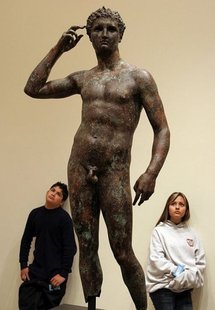
The top half of the bronze statue 'Victorious Youth'
"The court's order is flawed both procedurally and substantively," the Getty said in a statement.
Former culture minister Francesco Rutelli, who spearheaded Italy's efforts to recover the work, said Thursday's verdict was of "historic importance, ending the era of looting our archaeological heritage."
The culture ministry also hailed the decision with "great satisfaction."
The work, considered one of the greatest bronze statues to survive from ancient Greece, is attributed to Lysippos, one of the three leading sculptors of the period.
The lifesize statue, allegedly smuggled out of Italy, resurfaced 10 years after Italian fishermen found it in the sea off the Adriatic coast in 1964.
They sold it a few months later to an unnamed buyer for 3.5 million lire, which they shared among themselves.
Scholars believe that a Roman ship carrying the statue and other looted objects from Greece was on its way home when it foundered.
The Getty, set up by US oil billionaire and collector John Paul Getty and one of the world's richest art museums, insists it never knowingly bought illegally uncovered artefacts.
Its endowment was valued at 4.5 billion dollars (3.3 billion euros) in 2009.
Under a landmark agreement in 2007, the Getty returned dozens of other works to Italy after a dispute lasting nearly two years.
The Getty acquired many of the disputed works through an Italian dealer, Giacomo Medici, who was based in Geneva and described by Italian prosecutors as the "kingpin" in the international trade in looted Italian antiquities.
The two sides agreed to postpone discussion of the fate of the Getty Bronze until the outcome of the legal proceedings in Pesaro, an Adriatic port near the location of the find.
Rome reached similar agreements with the Boston Museum of Fine Arts and New York's Metropolitan Museum of Art which returned objects to Italy and signed on to long-running loans of significant artworks and joint exhibitions and projects.
Rutelli said after the 2007 accord that it helped "tighten the noose" around antiquities traffickers, arguing that both the supply and the demand for such works were shrinking.
Thursday's 37-page judgement against the Getty asserted that the Victorious Athlete belonged to Italy's cultural heritage and was thus not for sale, and that the US museum knew its provenance was illicit.
------------------------------------------------------------------------
Former culture minister Francesco Rutelli, who spearheaded Italy's efforts to recover the work, said Thursday's verdict was of "historic importance, ending the era of looting our archaeological heritage."
The culture ministry also hailed the decision with "great satisfaction."
The work, considered one of the greatest bronze statues to survive from ancient Greece, is attributed to Lysippos, one of the three leading sculptors of the period.
The lifesize statue, allegedly smuggled out of Italy, resurfaced 10 years after Italian fishermen found it in the sea off the Adriatic coast in 1964.
They sold it a few months later to an unnamed buyer for 3.5 million lire, which they shared among themselves.
Scholars believe that a Roman ship carrying the statue and other looted objects from Greece was on its way home when it foundered.
The Getty, set up by US oil billionaire and collector John Paul Getty and one of the world's richest art museums, insists it never knowingly bought illegally uncovered artefacts.
Its endowment was valued at 4.5 billion dollars (3.3 billion euros) in 2009.
Under a landmark agreement in 2007, the Getty returned dozens of other works to Italy after a dispute lasting nearly two years.
The Getty acquired many of the disputed works through an Italian dealer, Giacomo Medici, who was based in Geneva and described by Italian prosecutors as the "kingpin" in the international trade in looted Italian antiquities.
The two sides agreed to postpone discussion of the fate of the Getty Bronze until the outcome of the legal proceedings in Pesaro, an Adriatic port near the location of the find.
Rome reached similar agreements with the Boston Museum of Fine Arts and New York's Metropolitan Museum of Art which returned objects to Italy and signed on to long-running loans of significant artworks and joint exhibitions and projects.
Rutelli said after the 2007 accord that it helped "tighten the noose" around antiquities traffickers, arguing that both the supply and the demand for such works were shrinking.
Thursday's 37-page judgement against the Getty asserted that the Victorious Athlete belonged to Italy's cultural heritage and was thus not for sale, and that the US museum knew its provenance was illicit.
------------------------------------------------------------------------









 Home
Home Politics
Politics









